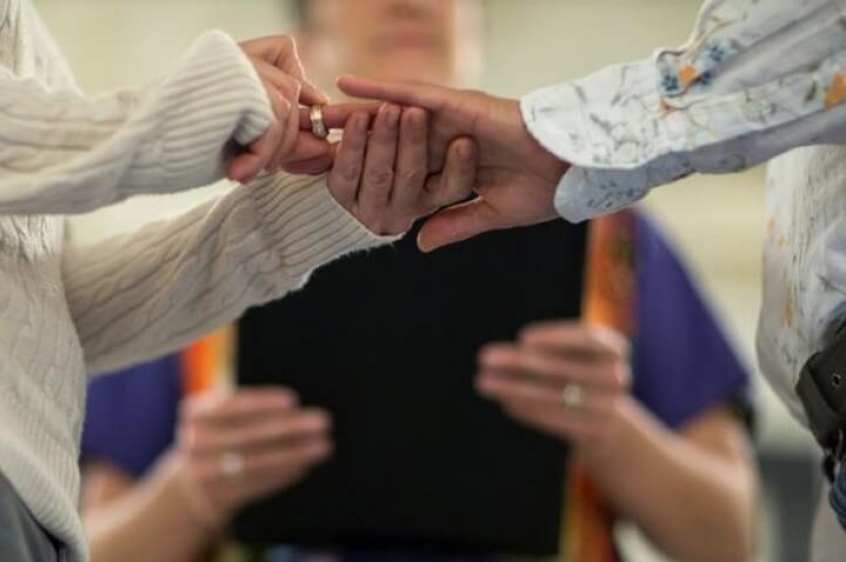In recent press we have seen a flurry of different voices, including from within the Church of England and on the softer side of the evangelical world such as Tony Campolo and Jen Hatmaker, in support of gay relationships. I remember my own distress when I heard of someone I looked up to at Wheaton College, Julie Rodgers, herself a same-sex attracted, celibate Christian, coming out in support of same-sex relationships and gay marriage. This news was like a pang in my chest as someone whose faith was brave enough to stand with God caved in to cultural pressure. In writing this I have decided to respond from my own vantage point of becoming a Christian from the world of anti-Christian gay rights activism.

When Alan Chambers Manning, ex-president of Exodus International, transitioned the ministry first from an 'ex-gay therapy' ministry (I was deeply relieved by this) to a parachurch ministry that provided pastoral support for same-sex attracted Christians who agree with the biblical position, I was greatly encouraged. However, then Chambers closed the ministry stating that it was "the responsibility of the Church" to support same-sex attracted or gay Christians, and not a parachurch ministry. This was an idealistic move with some grave cultural and pastoral impacts, weakening the support-base for Christians like myself. We find ourselves in churches who are petrified to touch this topic and paralysed by the fear of the gay lobby descending on them if they pastor us in our celibacy or inter-orientation marriages. Instead, we find ourselves repeating the error that St Augustine was haunted by from his 'Manichean' past: we fall into the dualism of either hating or affirming our fallen bodies.
I was recently involved in the Shared Conversations, a closed event at the General Synod of the Church of England, invited by the Archbishop of Canterbury, Justin Welby. I spoke as a representative of Living Out, a UK-based charity for people like myself who are either same-sex attracted and celibate or who are, by God's special and careful vocation, in an inter-orientation marriage (my story can be viewed here). I shared my testimony alongside three other younger panellists and was the only panel member to support the biblical position of homosexual sex as innately sinful. I spoke of our society's obsession with gay marriage as a result of the idolatry of romantic love in both modern expressions: 1950s conservatism and the 1960s libertinism, which led to both repressive and excessive immoralities.
As I shared my story of finding Jesus Christ in amidst our culture's current confusion, I said: "At the end of the day, what truly matters is not our view as the Church or as a society, what matters is what Jesus Christ is saying to us all." As a passionate evangelist, I said: "The lie that we are telling ourselves is that compromising holiness will ensure the growth of church numbers... Without holiness, Jesus Christ cannot be seen in us by the world and evangelism is of little or no value."
The general 'no' from the Christian world to gay marriage does not stem from a desire to hurt or persecute the LGBTQI community, but rather to faithfully represent how God in His Word has defined marriage. Today, we fall into the fatal error of either demonising or worshipping gay romance and other fallen expressions of erotic love.
As a same-sex attracted/gay celibate Christian, I don't see gay romantic relationships as something God is not involved with or God does not appreciate when agape love is present in the friendship bond. At the final judgment, when God separates out those who know Him and love Him from those who do not, I don't think everything involved in the friendship of a gay union will be lost. But I do believe it will be a separating out of the sexual aspect of the relationship from the friendship aspect for those who are gay and know Jesus.
The Church is falling into a dualistic error: the physical creation and the desires of our fallen bodies are either wonderfully and irrevocably good (there is no fall) or the physical creation is terribly bad (we must escape the body to find holiness). We are making the error that the world makes when it makes the body either supreme or subordinate to true relationship with God. We are met today with the proto-gnostic lie that the sexual differentiation of the male and female body is unimportant in defining the diversity within unity of the sexual union of marriage. As Genesis and Jesus' own teaching shows, the body's created design matters in the definition of the image of God, especially sexually in the 'one flesh' union.
If we peel back the story of scripture, though, what a gay couple really needs ([I myself have been in many), as we all do, is to find ourselves in a new identity altogether. This identity 'in Christ' means we integrate divine holiness with our good humanity, and let the rest be 'sanctified' out of us.
For me celibacy was the overflow of the work of grace within me. While I never felt 'called' to celibacy, I offered my body, with its complex desires, up to God, and in the power and beauty of his love let him define me. In surrendering all my desires, I received them back as Jesus wanted me to have them. This didn't involve my same-sex attraction changing, but it radically shifted the way I saw life in this fallen body.
To offer my body to God like Jesus on the cross is the way all Christians must go, gay or straight. As Paul says in Romans 12, offering our bodies up as a living sacrifice is our honourable act of worship. For the 'gay' person it means both the crucifixion of an old identity marker and unique and sacrificial act of worship in a culture that is obsessed with romantic or eros love and demands its worship. The depth of intimacy and the freedom I have experienced is something I would never want to trade for a gay relationship. Ultimately, Such a relationship has none of the goods I couldn't experience in a close covenant friendship.
Furthermore, such a relationship falls short corporeally from imaging God as outlined in Genesis: God's triune nature as distinct persons, God the Father, God the Son and God, the Holy Spirit yet One God in Love; the diversity of male and female, bodily and otherwise as seen in our distinct sexual fleshly beings is essential in the covenant of marriage in order to reflect the distinction of the triune personae. My celibacy is a sign of support for God's design and glory in humanity sexually and an enactment of the hope of Heaven and the ultimate spiritual friendship we will all enjoy. One day, all that is 'in Christ' will be whole and none will be given in marriage, but all will be united in Christ's love in perfect relationship and that blissful and perfect spiritual friendship we now experience from our Lord Jesus Christ.
I believe ultimately, that while a gay relationship is not bad in the dualistic sense, it is not our Lord's desire for our bodies, falling short of his desired standard. I do not commit the error of disrespecting the humanity of my gay affirming brothers or sisters, though I truly believe celibacy to be the better option. While salvation is not by heterosexuality or homosexuality but by faith alone in Jesus Christ, if we hold on to our sexuality identity as our ultimate need or ruling Lord for our flourishing here and now we will be the least in the Kingdom of Heaven, instead of showing forth what Heaven will look like now in holiness. The question we must ask is not, Can a gay relationship be made holy? but rather, Does a gay relationship reflect God's image and glory and desire for the sexuality of the human body as shown in his clear and distinguishing design?
David Bennett is a post-graduate student of theology at the University of Oxford.













